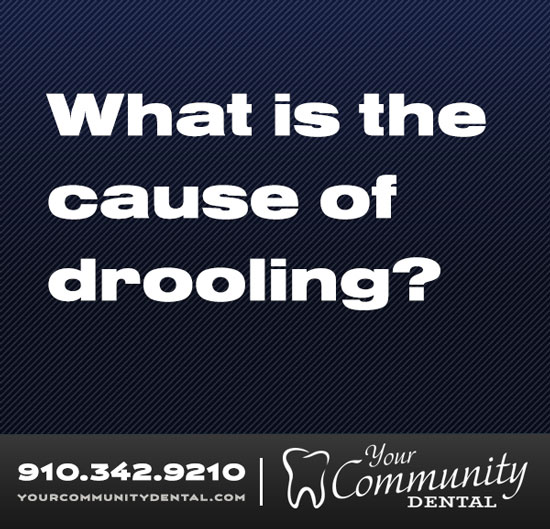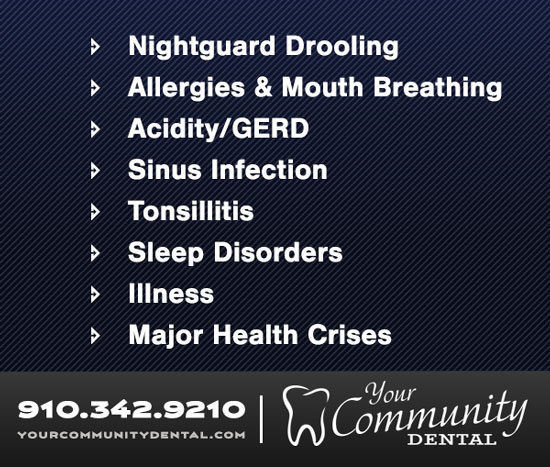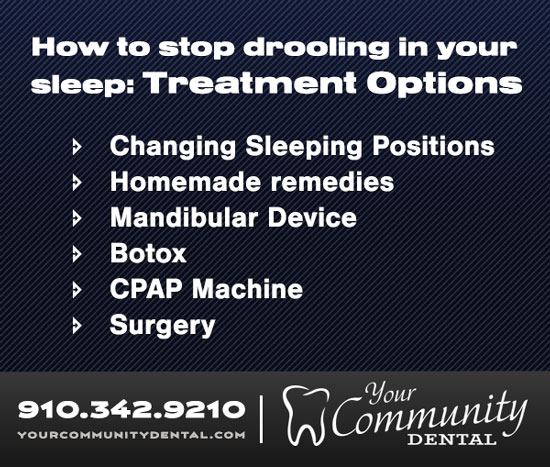What Causes Drooling?

It’s a question we’ve all asked at one point or another. Sure, you never drool, but just in case you know a friend or family member who does, it’s worth knowing more about! Your Community Dental is here to cure your curiosity on the topic, with a few facts and some information that might be helpful for “your friend”.
When we think of drooling, we picture a cartoon swooning over another character, saliva dripping from the corner of the mouth. But for some of us, drooling is part of our reality. Many of us are familiar with waking up to drool stains on our pillow, especially if we’re side-sleepers, or wiping away the constant drool from a baby’s mouth. But when is drooling no longer normal and what even causes it? Your Community Dental is happy to delve in.
What is the cause of drooling?
It might be a surprise to those of us who drool, but we produce quite a bit less drool when we sleep than while we are awake. It’s pretty natural that our muscles relax as we sleep. So why do we drool? Well, the answer is gravity. When we sleep on our back, the saliva rests in the back of the throat and drains. When we sleep on our sides or stomach, accumulated drool can slip through your lips.
However, drooling doesn’t always occur because we sleep.
What should be taken into consideration if I’m drooling?
Your dentist might ask the following questions:
- Are there any known medical issues?
- Do you have any issues with allergies?
- Are you known to be a mouth breather?

Depending on how and when it’s occurring, or even down to the individual, drooling can have a number of causes. We’ll discuss a few of the more common ones below:
Nightguard Drooling
Wearing a dental night guard is not the most comfortable bedtime routine, and when they’re new to us, it feels unnatural and uncomfortable. As you adjust to night guards, you might experience drooling. We know there’s nothing worse than wet, soggy pillows, but rest assured (no pun intended, here) that the drooling is temporary. It might take a few weeks for your brain to get used to the appliance in your mouth, but it will eventually adjust and your glands will return to producing a normal amount of saliva as you sleep.
Allergies & Mouth Breathing
Blocked nasal passages due to allergies can cause you to breathe through your mouth, and lead to increased drooling.
Acidity/GERD
This digestive condition washes stomach acid back into the esophagus, and can cause difficulty swallowing. This can lead to excessive drooling for some people.
Sinus Infection
Blocked sinuses are never fun, so if you’re experiencing nasal congestion due to an infection, or have regularly enflamed sinuses, you might find that you are breathing through your mouth more often and drooling.
Tonsillitis
This condition inflames the glands in the back of your throat, or your tonsils. As the glands swell, the passage becomes more narrow, and obstructs the drainage of saliva.
Sleep Disorders
Drool is a known symptom in those suffering from sleep terrors or sleep conditions like sleep apnea, sleep walking, and sleep talking. Sometimes the medications taken to counteract these conditions can also cause increased saliva production.
Illness
Common illnesses such as strep through, infectious mononucleosis, and sinus infections can cause people to experience excess drooling.
Major Health Crises
After a stroke, or as a result of cerebral palsy or multiple sclerosis (MS), drool can be a symptom of a neurological condition or other health condition.
Medical issues that are symptomatic of drooling can range in severity, and include a variety of conditions. Drooling can occur from posturing issues or low muscle tone in the lips, jaw, and tongue. More severe issues may require a specialist, such as a speech pathologist. But, some drooling may be a cause of more simple conditions like allergies, sleep deprivation, or sleeping on your side.
At what age is drooling normal?
Drooling is a normal process throughout infancy and toddler stages. Infants have immature musical control, and saliva helps soften food and eases swallowing. Increased saliva actually protects babies’ teeth from tooth decay. Drooling becomes more frequent around three to six months of age. Because babies’ teeth are erupting from the gums, their saliva production increases, and thus, increased drooling. Once children are past the toddler milestone, drooling can be a sign of further social and developmental issues.
How do I know if my drooling is normal?
Talk to your dentist and your doctor. If drooling is decreasing your quality of sleep or otherwise creating issues, then it might be time to seek medical help. If you’re experiencing a known major illness or health condition, talking to your medical professionals is the best way to determine if your drooling is normal.
How to stop drooling in your sleep: Treatment Options

Identifying the cause of your drooling is the first step to treating it. If your drooling stems from allergies, sinus problems, or other minor conditions, it’s likely that that your drooling is due to breathing through your mouth. For some cases, there is an easy fix, while more extensive cases require different treatments.
Changing Sleeping Positions
The good news is that there’s an easy fix! We recommend aiming to sleep on your back instead of your side. This will keep the saliva draining down your throat, rather than out of your mouth. By purposefully sleeping on your back, you might notice if you struggle with breathing or experience acid reflux, and seek further treatment.
Homemade remedies
Homemade remedies are also worth trying. Some people suggest that to decrease drooling, biting a lemon wedge, consuming citrus, or drinking more water will thin the saliva and make it less likely to pool in your mouth.
Mandibular Device
Some treatment options are more rigorous. Your dentist might recommend a mandibular device to help you sleep more comfortably and drool less. This oral device is like a night guard. Your dentist can direct you where to purchase a mandibular device, but they can sometime be purchased online.
Botox
Another option is Botox injections. While this sounds a bit aggressive, it’s a viable approach to reduce hypersalivation. By injecting Botox into the saliva glands, the glands will stop overproducing saliva. This treatment is only temporary though, and your glands will return to their normal function after the Botox wears off.
CPAP Machine
If your drooling is a result of sleep apnea, then a Continuous Positive Airway Pressure (CPAP) Machine will make sure you’re positioned safely as you sleep and breathing properly, thus getting a better, deeper night’s sleep. It should be noted, though, that the CPAP may not entirely prevent drooling.
Surgery
In extreme cases, it may be recommended that you remove your saliva glands. This is usually the treatment when people have underlying neurological issues, and aren’t merely experiencing discomfort drooling while sleeping. These surgeries are usually very successful, but are not the first treatment option for patients experiencing drooling.
At the end of the day, drooling is not embarrassing or particularly unusual. Most of the time, drooling can be curbed by minor changes in habit or through simple treatment options. If you are concerned about drooling or whether or not your saliva production is normal, Your Community Dental is here to assess your oral health. Your dentist will discuss with you if drooling is a sign of a more serious health diagnoses, and get you on the right track for treatment. Call Your Community Dental today to schedule an appointment.
